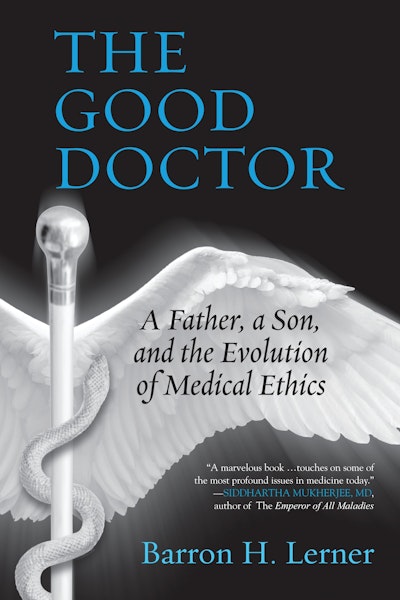- Published: 1 September 2018
- ISBN: 9780807035047
- Imprint: Beacon Press
- Format: Paperback
- Pages: 240
- RRP: $39.99
The Good Doctor
A Father, a Son, and the Evolution of Medical Ethics
- Published: 1 September 2018
- ISBN: 9780807035047
- Imprint: Beacon Press
- Format: Paperback
- Pages: 240
- RRP: $39.99
“Exquisitely insightful... The Good Doctor poses a fundamental riddle faced by every historian: How can we question the decisions and attitudes of our forebears without having experienced the contexts that shaped them? It makes for a particularly compelling discussion when the players are father and son, sharing as their lives’ work an ethically charged, ever-changing profession.” —New York Times “Barron Lerner’s marvelous book—a deeply intimate story about his father and the practice of medicine—touches on some of the most profound issues in medicine today: autonomy, medical wisdom, empathy, paternalism and the evolving roles of the doctor and patient. This is one of the most thoughtful and provocative books that I have read in a long time, and I suspect that generations of doctors and patients will find it just as thought provoking.” —Siddhartha Mukherjee, author of The Emperor of All Maladies “The Good Doctor is a lovely book and a loving book; it's a book about medicine and family and ethics and history which embraces complexity and speaks to all those subjects with wide-ranging compassion and great good sense. And it's a father-son doctor saga with much to say about the healing power of story and understanding.” —Perri Klass, MD, author of A Not Entirely Benign Procedure and The Mercy Rule “An absolutely compelling treatise on bioethics told thru the lens of a physician's relationship with his physician father. If you want to understand the modern state of ethics in medicine, read this book.” —Mehmet Oz, MD, Professor and Vice Chair, Surgery NY Presbyterian/Columbia “A heartwarming story about a father-son doctor duo spanning a century, exquisitely showing the evolution of medical practice from antibiotics through bioethics. A small gem of a book.” —Samuel Shem, MD, author of The House of God and The Spirit of the Place “The younger Lerner is occasionally shocked by his father’s belief that his intimate knowledge of his patients and their diseases gave him insight and authority on what was best for them, including the proper time to stop treatment and allow a patient to die. Yet Lerner does more than criticize; he thoughtfully examines the case for both ways of practicing medicine, and in many ways the book is a tribute as much as a critique. Perhaps, Lerner argues, there is an appropriate middle ground behind the father’s art of care and the son’s.” —Health Affairs From the Hardcover edition.

